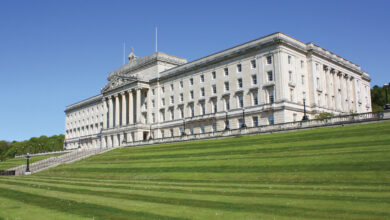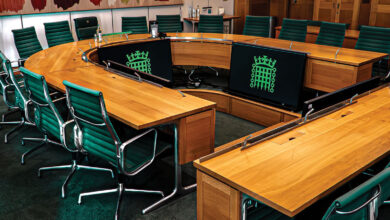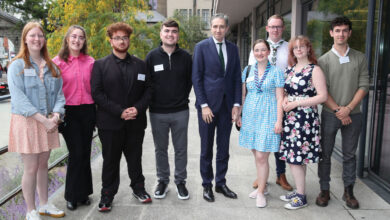Recording a divided past: the Oral History Archive


The Stormont House Agreement proposed several core legacy mechanisms, including an Oral History Archive. As the consultation phase continues, agendaNi reviews the reaction of the academic-led Model Bill Team to the proposals.
Of all the issues of contention surrounding the legacy of Northern Ireland’s past, the creation and operation of an Oral History Archive (OHA) has been highlighted as a potential success for victims and survivors. Integral to the establishment of such an archive are the recommendations of the Model Bill Team, which is comprised of field experts from Queen’s University Belfast, Ulster University, the Transitional Justice Institute and the Committee on the Administration of Justice (CAJ). Whilst the group have collectively welcomed the inclusion of an OHA, several amendments and counter-proposals have been recommended.
The OHA’s Model Bill Team highlighted several key strengths contained in the draft Bill proposals. Acknowledged as a key strength is the geographic reach of the archive, with individuals across the entire United Kingdom and Republic of Ireland granted the opportunity to contribute to it. Similarly, proposals for the creation of a steering group have been welcomed, along with proposals to include “other relevant records” to be preserved alongside primary interviews.
The academic-led team have also welcomed the inclusion of existing oral history records as part of the archive, as well as the inclusion and preservation of confidential records which may not be suitable for immediate publication, but which may be of value to future generations. The lack of time limit imposed upon the building of an archive has similarly been highlighted as a key strength due to its potential facilitation of intergenerational work.
The OHA’s Model Bill Team have, however, been limited in their praise for the current proposals. Attention has been drawn to a number of “key weaknesses” which, according to the group, must be addressed “in order to ensure that the OHA garners the trust and co-operation of victims and survivors right across our society”. Criticisms of the proposals are broad in nature and range from issues of independence and methodology to legal protection and the appointment of staff.
A question of detail
The Model Bill Team drew attention to the NIO consultation paper’s apparent focus on oral history as a methodology and steps which may be taken to publicise the OHA. According to the group, insufficient focus has been placed on whether the model proposed for the Archive (whereby it is under the charge and superintendence of the Deputy Keeper of the Public Records Office of Northern Ireland) welcomes all sections of the community to participate in the Archive. Criticism has also been directed at the perceived lack of detail surrounding how the model would work in practice.
The team recommended that the NIO publish a detailed paper outlining how exactly it envisages the OHA working in practice, including: specific details on how individual stories or interviews would be selected and prioritised; how interviewers would be appointed; a draft code of conduct; policies and procedures governing access; whether or not there should be a ‘central’ space for members of the public to visit; and how they propose to honour the Stormont House Agreement’s commitment to “draw together and work with existing oral history projects”.
Meaningful independence
The independence of the OHA has been highlighted as “fundamentally flawed” under the proposed model. This has largely been attributed to the power granted to the Public Record Office of Northern Ireland (a division of the Department of Communities) and its Director (the Deputy Keeper) and how it would be given the function of organising the OHA. Current proposals would have granted a senior career civil servant, accountable to the Minister of Communities, several means of controlling the flow of information into and out of the OHA.
Such power granted to a civil servant amounts to a mere “fig-leaf” of independence, according to the Model Bill Team. Indeed, it has been recommended that the OHA is placed “on a suitably independent footing”, with “real and meaningful checks and balances” placed on the powers of the Deputy Keeper.
Steering groups, appointments and existing projects
Much attention has been drawn to the role and powers of any steering group which may oversee the OHA. Current proposals have been highlighted as granting few real or meaningful powers to a steering group. Recommendations have suggested inverting the proposed model so that any steering group would take “charge and superintendence” of the OHA, with full decision-making powers. It is claimed that such a move would succeed in curbing the political interference and bureaucratic tendencies frequently seen in ‘top-down’ civil service models.
The Model Bill Team has also recommended that the criteria for appointments to the OHA’s steering group are “clear, specific and transparent”. The ESRC and its sister body, the Arts and Humanities Research Council, have been proposed as potential assistants in establishing and applying criteria for appointments to the steering group.
The Stormont House Agreement states that the Oral History Archive “will attempt to draw together and work with existing oral history projects” in the form of a PRONI commitment to facilitate the inclusion of existing oral history records. This commitment, according to the Model Bill Team, is “unduly passive”. The group recommended that “a concerted effort” should made to encourage participation in and cooperation with the OHA in a “spirit of partnership”. The group noted that cooperation could be “mutually beneficial” to all organisations involved.
The inclusion, redaction and destruction of records
The proposed role of the Deputy Keeper in determining the significance and relevance of oral records, as well as whether they fulfil the criteria of possessing the “required connection” with the Troubles to take part in the programme has been heavily criticised. Similarly, the draft Bill’s approach to enlisting the support of a broad range of contributors was described as “an entirely passive policy whereby individuals are simply invited to come forward”. Respondents to the consultation paper cautioned lawmakers about the “lazy reliance” on “voluntary self-selection”, claiming that this approach attracts only the ‘middle-groups’ in society and “perpetuates the exclusion of marginalised groups and individuals”.
The Model Bill Team stated that: “It is curious that, although the draft Bill proposals contain hardly any detail about how individual contributors and existing oral history groups might be persuaded to engage with the archive, there are no fewer than 10 sub-sections on the procedure for disposing of records (by destruction or otherwise)”. It also states that “there is no mention of any obligation to inform the individual human beings to whom the records relate, or to give them any say in what happens to their records”. According to the group, “this type of approach tends to feed accusations of a ‘state-centric’ model that is more concerned with protecting the institution than the individuals it was designed to help”. In response to these observations the team recommended that decisions surrounding the destruction of records should be taken only by an experienced steering group, whilst contributors should be given greater say over decisions affecting their story.
Overarching criticism of proposals for an Oral History Archive have, however, centred around questions of accountability and funding. “It is totally unacceptable, in our view, to grant a senior civil servant, accountable to the Minister for Communities, sole discretion to determine which stories can be admitted to the OHA, which should be redacted, withheld or destroyed” stated the group. Regarding funding, the group recommended that funding should be allocated from the Consolidated Fund through the UK Treasury, as opposed to being funded through the budget of the Department for Communities.
Such criticisms of the Oral History Archive come at a time of intense debate surrounding the role of civil servants in decision-making, particularly in the current phase of ministerial absence at Stormont. The NIO is expected to respond to feedback in the coming months.





